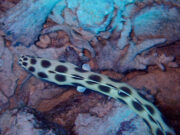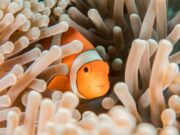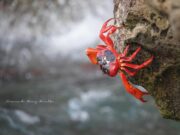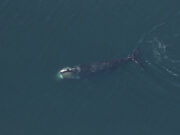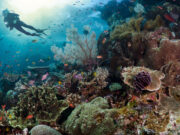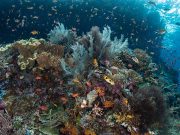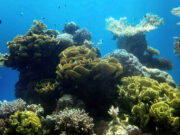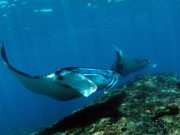Jill Studholme
Dugong – the Lady of the Sea
Dugongs - where can you dive with them and why aren't there more of them? Said to have inspired tales of mermaids, they can eat as much as 40 kg (88 lb) of seagrass a day, leaving distinctive troughs.
How to judge whether shark cage diving helps or harms wildlife
Wildlife tourism including white shark cage-diving is growing in popularity, but these industries remain highly contentious amongst divers, conservationists and scientists alike. New tool helps judge the impact.
Dolphins and humans have similar personality traits
Researchers find dolphins to be far more similar to humans than previously thought.
For those who have ever observed...
Fabulous Feather Stars
By day these beautiful animals keep curled up but on night-dives you see them in their
warm colours, with their feathery arms extended.
Octopus steals camera and wins underwater photography competition
Best of Show is a once-in-a-life-time moment where a curious octopus took a selfie of itself with the photographer's family.
Silky sharks conservation effort working in Atlantic, but Indo-Pacific still a problem
99.8% of shark fins come from Indo-Pacific: conservation efforts in Atlantic Ocean are working
Creature of the Month: Oceanic Whitetip Shark – Carcharhinus longimanus
Diving with Oceanic Whitetips
The glorious oceanic whitetip sharks spend a lot of time in shallow water, tend to swim slowly and are...
Enter the Ocean Art 2020 underwater photography competition
From now to 30 November 2020 you can submit your images to the prestigious Ocean Art competition. Prizes worth $40,000 are on...
Creature of the Month: Golden Trevally
The young fish like to seek out large animals like sharks, groupers and dugongs for protection, acting as pilot fish.
Sex-changing fish recover more quickly from over-fishing
People eat a lot of fish. Different sex-changing fish can follow several signals that prompt them to change sex. Some change from female to male at a fixed size or age. Often, fisheries will only harvest fish over a certain size. This means catching more males because they are usually bigger, which then skews the population towards female. Not enough males are then available to fertilise all the eggs produced by the females.

